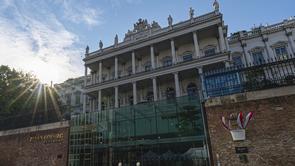Washington’s poor record on 2015 pact casts cloud over any revived accord, experts say
 The sun sets behind the Palais Coburg where closed-door nuclear talks take place in Vienna, Austria, Aug 5, 2022. (FLORIAN SCHROETTER / AP)
The sun sets behind the Palais Coburg where closed-door nuclear talks take place in Vienna, Austria, Aug 5, 2022. (FLORIAN SCHROETTER / AP)
The durability of a restored Iran nuclear deal that may emerge from protracted negotiations will depend on the actions of the United States, say experts who fear a repeat of Washington’s 2018 dumping of the original pact.
The comments from observers of the drawn-out talks come as the US pursues concessions from Iran to enable, from Washington’s perspective, the resurrection of the scuppered 2015 agreement.
The experts also said that Iran’s reengagement with the world economy, now limited by US-led sanctions, through a renewal of the deal would offer relief to a global system that has been battered by the pandemic and the Russia-Ukraine conflict.
In a media conference in Teheran on Aug 29, President Ebrahim Raisi said the lifting of anti-Iran sanctions and the unfreezing of Iranian assets abroad have been at the core of the nuclear talks.
He said that Iran does not seek to develop nuclear weapons but would employ nuclear technology for civilian purposes, and that Iran’s nuclear industry and nuclear capability “are the right of the Islamic Republic and the people of Iran”.
Raisi said his country seeks to use nuclear technology in sectors covering agriculture, oil and gas, and healthcare, among others, and that safeguard issues should be resolved before an agreement is reached between Iran and the other signatories to the deal: China, France, Russia, the United Kingdom and the US, plus Germany.
He was referring to reports from the International Atomic Energy Agency, or IAEA, about the alleged “discovery of uranium traces” in three locations that “has not been announced” by Iran. Iran insists the accusations are “political” and that the case should be closed “forever”.
Jawaid Iqbal, chairman of the Department of West Asian and North African Studies at Aligarh Muslim University in India, said the latest indirect talks between Iran and the US regarding the Joint Comprehensive Plan of Action, or JCPOA — the formal name of the 2015 nuclear agreement — “will not play out in a simple manner”.
Iqbal said that Teheran has laid down three conditions for accepting the EU’s proposals: the lifting of sanctions, the guarantee that no future US president will renege on the nuclear deal if it is revived, and the closure of the IAEA’s probe into several Iranian nuclear sites where man-made nuclear particles were found several years ago.
“The US has been unwilling to allow these concessions due to the presence of hawkish foreign policy experts in US President Joe Biden’s administration and the pressure being applied by the Zionist lobby,” Iqbal said.
“The planned visit of Mossad head David Barnea to Washington next week for talks on the Iranian nuclear deal is indicative of the fact that anti-Iranian hysteria will continue to act as a stumbling block in the restoration of the JCPOA.”
English-language online newspaper Times of Israel reported that Barnea, the chief of Israel’s intelligence agency, will travel to Washington to discuss the Iran agreement, which Barnea and Israeli government officials have criticized.
The report said a senior Israeli government official confirmed that the White House was aware of Barnea’s trip but was keeping quiet on whether the Biden administration was involved in its planning.
Despite the challenges, Arhama Siddiqa, a Middle East expert and research fellow at the Institute of Strategic Studies Islamabad in Pakistan, said the US and Iran appear to have resolved many “bones of contention” that have been impediments to the revival of the deal — something that was “unthinkable even until last year”.
She said it would not have been possible had it not been for the Russia-Ukraine conflict, which has left a significant gap in oil supplies.
“The longevity of the deal will depend upon a concrete assurance by the US to not unilaterally withdraw from the deal as it did the last time,” Siddiqa said.
Negotiations on the revival of the 2015 deal began in April last year in the Austrian capital Vienna, but were suspended in March because of differences between Teheran and Washington.
Xinhua contributed to this story.


